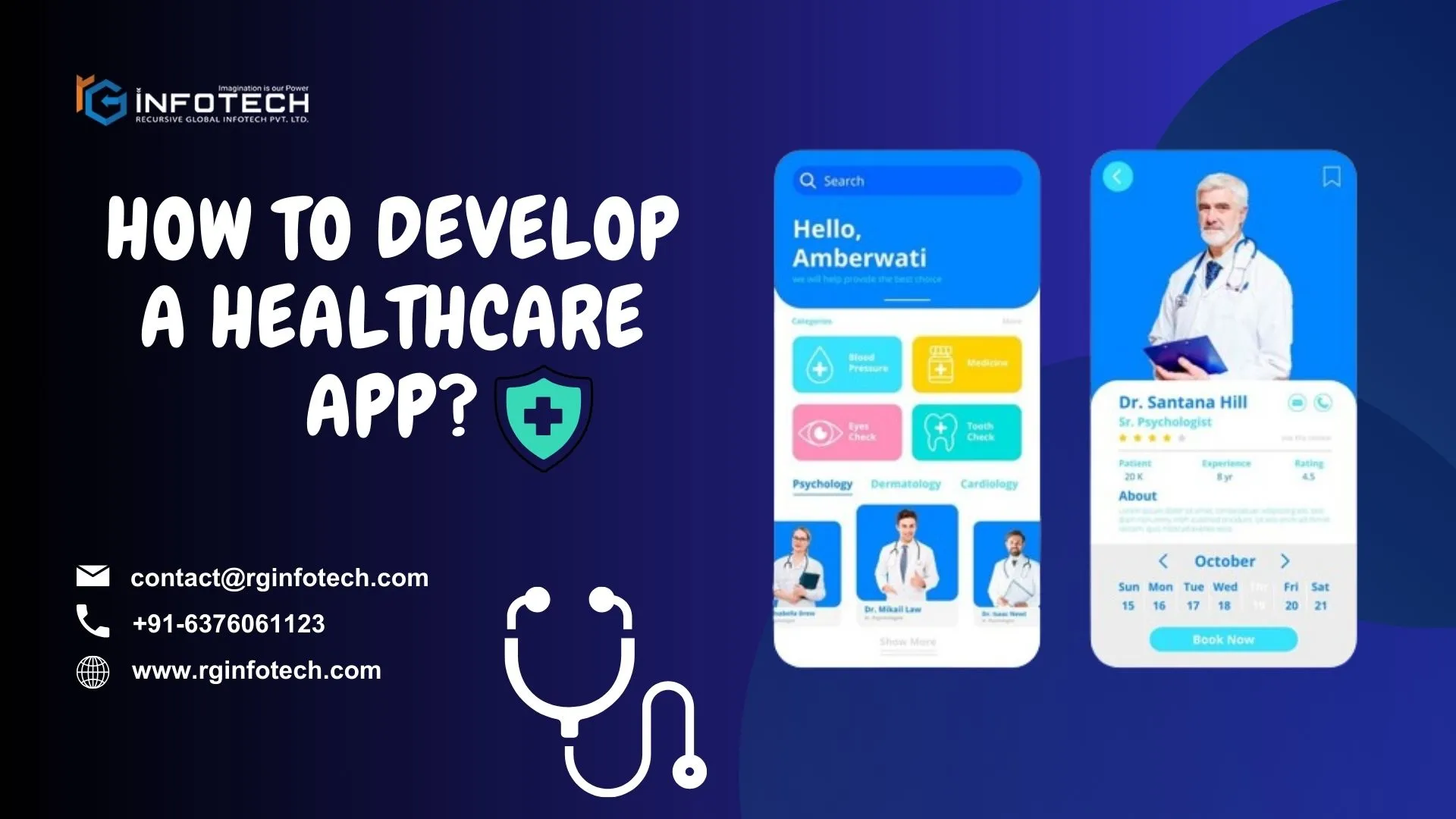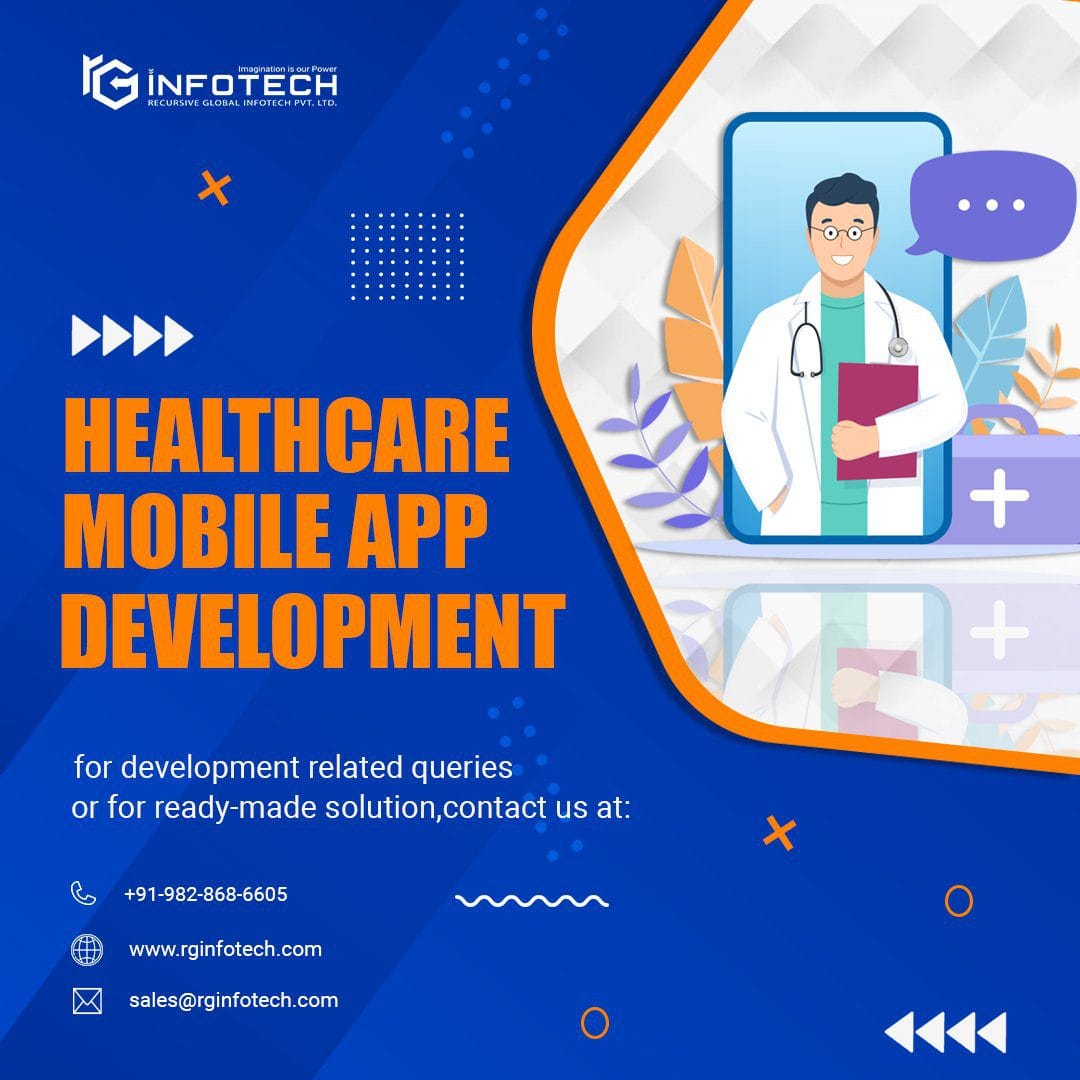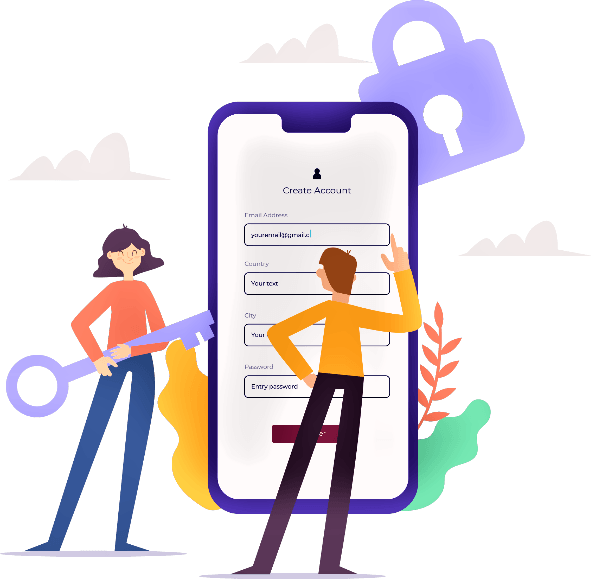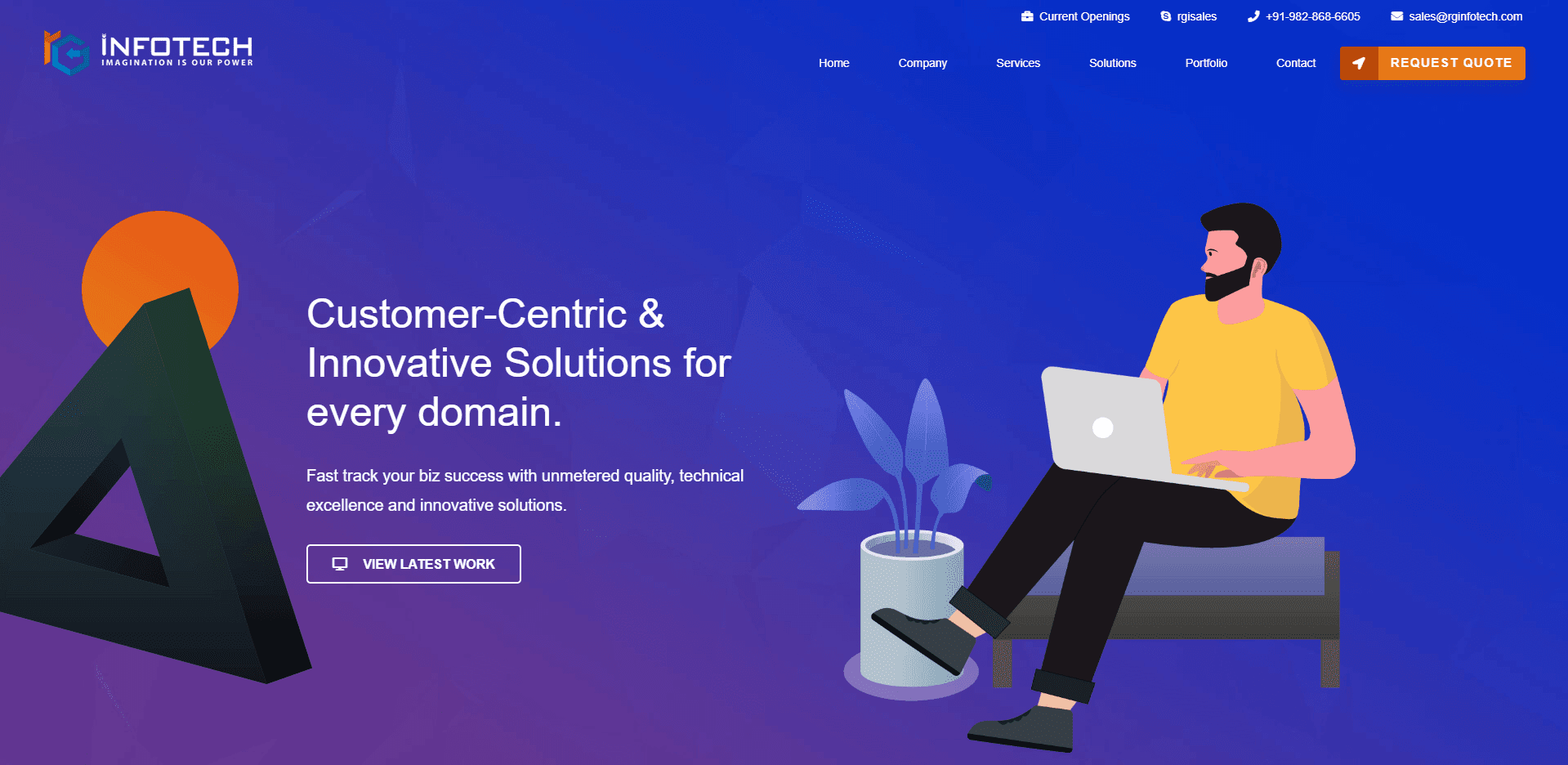Step by Step Guide to Develop A Healthcare App

How to Develop A Healthcare App? To develop a Healthcare application, you need to understand the industry and its regulations. The initial step is to conduct thorough research into the specific requirements of the target audience, whether it’s doctors, patients, or healthcare providers. Knowing your audience will help shape the design and features of your app.
The healthcare app development industry is rapidly evolving with advanced tools and technologies like Artificial Intelligence, machine learning, and IoT. Medical applications now provide predictive analytics, individualized patient experiences, and smooth interoperability across various healthcare systems.
As a result, technologies introduced by the best healthcare app development agency can help medical personnel make better decisions, work more effectively, and save on operating expenses, while patients can take advantage of sudden interventions, real-time tracking of health data, and greater communication with healthcare providers.
The growing digital revolution in healthcare emphasizes how important app developers are to the future of the sector. A mobile app development company might profoundly impact the delivery, management, and experience of healthcare around the world if it uses advanced technologies and prioritizes user-centric design.
What is A Healthcare App?
Heath apps are software programs on mobile devices designed to process health-related data for their users. These apps can be used by anyone who is health-conscious to maintain, improve, or manage the personal health of the community. Blockchain healthcare app development Includes a wide range of features and functionalities, from health/fitness tracking to chronic disease management and telemedicine.
As an umbrella term, health apps also include medical apps, which are specialized for more clinical and medical purposes like diagnostics, patient management, and healthcare-provider communication. Whether for individual use or broader community health initiatives, these applications play a crucial role in modern healthcare by making health management more accessible, efficient, and effective.
Stats And Facts Showcasing The Rise Of Healthcare Apps
Here are some interesting facts and statistics regarding the healthcare app development market.
- The global healthcare mobile application consulting services market is set for significant growth, expected to reach $74 billion by 2028 with a CAGR of 18%. These healthcare app statistics certify that the surge in demand is driven by increased customisation and expanded functionality across service segments.
- Web3 healthcare app development is getting more popular day by day. Currently, there are over 325,000 health apps available on various app stores. In the United States, 54% of citizens have at least one healthcare app on their device, with 30% having three or more.
- The medical revenue cycle management (RCM) apps segment is valued at $2.7 billion and is projected to reach $13.5 billion by 2027. This underscores the ubiquity of app-based billing solutions in clinics and healthcare facilities.
- In the US, over 60% of healthcare companies are taking advantage of some form of mHeath. Telemedicine, remote patient monitoring (RPM), and iOS and Android healthcare app development are topping the priority list, as revealed in a recent survey.
- Furthermore, 96% of hospitals are intending to accept and use clinical mobile apps by 2023. With staffing shortages becoming more prevalent, clinical workflows are being extensively streamlined through optimized medical apps.
What Are The Beneficial Aspects of Healthcare Apps for Doctors and Patients?
The app development team provides many advanced healthcare app development services to meet the primary needs of patients and physicians, which is one of the reasons it has become so popular. According to a top healthcare app development company, the healthcare app has a few noteworthy benefits, which I’d like to outline here.
Benefits of Healthcare App Development for Doctors
- Harnessing Remote Assistance: According to AI healthcare app development experts, these apps help doctors extend their healing touch beyond clinic walls. Whether they’re miles away or just a screen tap apart, doctors can monitor patient health, offer consultations, and streamline care delivery via calls, video chats, or in-app messaging.
- Efficient Workload Management: With the power of mHealth apps, doctors can orchestrate their schedules with precision. From setting up appointments at optimal times to managing crucial tasks on the go, these apps empower doctors to juggle their responsibilities seamlessly, ensuring every patient gets the attention they deserve.
- Streamlined Documentation: Gone are the days of drowning in paperwork. A top custom healthcare app development company introduces healthcare apps that offer digital documentation solutions that streamline record-keeping, ensuring accurate and up-to-date patient information is readily accessible.
- Elevating Brand Presence: In the digital age, a strong brand presence can be a potent remedy for fostering patient trust and loyalty. By embracing healthcare apps, clinics and practitioners amplify their visibility, instilling confidence in patients who seek care from a reputable and digitally savvy source.
Also Read: Doctor Appointment App Development Company
Benefits of Healthcare App Development for Patients
- Health Data Management: It allows patients to centralize and manage their health data efficiently using healthcare apps. From medical records and lab results to fitness metrics and diet logs, these applications provide a detailed overview of their status, enabling patients to track progress, identify trends, and make informed decisions regarding the care they provide.
- Frugal Healthcare App Development Solutions: Say no to the long commutes and high medical costs. Patients enjoy affordable healthcare options with online appointments made through healthcare applications. By reducing the cost of traveling and wait times, these apps redefine affordability without putting holding off on general care.
- Refined Treatment Experience: Introducing health applications, and revolutionary tools designed for patient care. These apps offer custom treatment methods for patients by using easy-to-use digital devices and video consultations. Physicians have the authority to diagnose, recommend, and oversee treatment plans, all from the comfort of an intuitive smartphone interface.
- Streamlined Transactions: Embrace hassle-free payments and paperless transactions. With the tap of a finger, patients can schedule appointments, manage prescriptions, and settle bills, all within the confines of a healthcare app. It’s the epitome of convenience, putting financial worries to rest and ensuring a seamless healthcare journey.
- Seamless Remote Assistance: In the realm of medical app development, distance is no longer a barrier to quality care. Patients can access remote assistance for a myriad of medical concerns, bypassing the queues and delays of traditional healthcare settings. From diagnosis to treatment, it’s healthcare at your fingertips, revolutionizing the way patients receive care.
Why Should We Invest in Healthcare App Development?
Investing in mobile healthcare app development presents numerous opportunities and considerations. Let’s delve into the key aspects that make it a worthwhile venture:
Catering to Healthcare’s Massive Growth Potential
The global mHealth app development market is on a trajectory to reach $74 billion by 2026. This exponential growth signifies the vast scalability of custom healthcare app development to meet the evolving needs of patients and the industry. Customized apps provide a first-mover advantage, allowing businesses to tap into upcoming solutions in telehealth, wellness, administration, and beyond.
Enhanced Practice Efficiency and Reduced Costs
Digital tools streamline clinical workflows, documentation, and remote monitoring, significantly optimizing operations. For instance, medical billing apps can cut turnaround time by 75%, thus boosting revenue for clinics. Additionally, telehealth consultations can lower no-show rates, leading to decreased financial losses.
Improved Patient Outcomes and Experience
Well-designed healthcare mobility solutions play a pivotal role in enhancing patient outcomes and experiences. Self-management apps for chronic illnesses improve treatment adherence, while monitoring software aids in early disease detection and management, resulting in fewer complications. Moreover, virtual care delivery expands access to quality healthcare, thereby boosting patient satisfaction scores through personalized engagement.
Gains Competitive Advantage
Healthcare providers that leverage comprehensive app portfolios elevate their value proposition and attractiveness to patients. The crucial features of healthcare app development may include automated appointment scheduling, billing support, and integrated electronic medical records (EMR) that uphold premier customer service standards. This level of efficiency and comprehensive care offerings pose a challenge for competitors to match, ultimately setting businesses apart in the market.
Addresses Staff Shortages And Attracts Talent
The looming shortage of over 120,000 doctors and 400,000 nurses in the US by 2030 underscores the importance of technology in filling this gap. Android and iOS healthcare app development extend care to underserved areas, while virtual support mitigates burnout among healthcare professionals. Automated documentation frees up clinical hours, allowing staff to focus on delivering quality care.
How to Develop A Healthcare App?

An outsourcing healthcare app development company follows several crucial steps to ensure its success and effectiveness in addressing the needs of patients, healthcare providers, and other stakeholders. Here’s a comprehensive guide to the steps involved in developing a healthcare application:
- Identify the Purpose and Target Audience: Define the specific purpose of the healthcare application and identify the target audience, whether it’s patients, healthcare providers, carers, or other stakeholders.
- Conduct Market Research: Conduct thorough market research to understand existing healthcare apps, identify gaps or opportunities, and gather insights into user needs, preferences, and points that require improvement.
- Define Key Features and Functionality: Based on the identified purpose and target audience, outline the key features and functionality that the healthcare application will offer. This may include appointment scheduling, telemedicine consultations, medical records access, medication reminders, symptom tracking, and more.
- Design User Interface and Experience (UI/UX): Create intuitive and user-friendly interfaces that prioritize ease of navigation, accessibility, and aesthetics. Experts work on healthcare app design, wireframes, and prototypes to visualize the app’s layout and flow before moving on to development.
- Choose the Right Technology Stack: Select the appropriate technology for healthcare app development. The selection of a technology stack may involve considering factors such as platform compatibility (iOS, Android, web), scalability, security, and integration capabilities with existing healthcare systems.
- Develop Backend Infrastructure: Build the backend infrastructure to support the functionality of the healthcare application, including databases, servers, APIs, and cloud storage solutions. Ensure compliance with data privacy and security regulations (HIPAA, GDPR, etc.) to protect sensitive patient information.
- Develop Frontend Components: Develop frontend components of the healthcare application, including user interfaces, navigation menus, forms, and interactive features. Implement responsive design principles to ensure compatibility across different devices and screen sizes.
- Implement Security Measures: Implement robust security measures to protect patient data and ensure compliance with healthcare regulations. This may include encryption, authentication, access controls, data backup, and regular security audits.
- Test and Quality Assurance: Conduct thorough testing and quality assurance to identify and address any bugs, errors, or usability issues. Perform functional testing, compatibility testing, performance testing, and security testing to ensure the reliability and performance of the healthcare application.
- Deploy and Launch: Deploy the healthcare application to the appropriate app stores (Apple App Store, Google Play Store) or web hosting platforms. Plan a strategic launch and marketing campaign to promote the app and attract users.
- Monitor, Maintain, and Update: Continuously monitor the performance and usage of the healthcare application, gather user feedback, and address any issues or enhancements. Regularly maintain and update the app to ensure compatibility with new devices, operating systems, and security patches, as well as to introduce new features and improvements based on user needs and market trends.
What is The Healthcare App Development Cost?
The method of determining the cost of healthcare application development can be complex and varies depending on several factors. It includes the app’s scope, features, complexity, and development approach. It’s challenging to provide a concrete price or estimate without a thorough understanding of the specific requirements and priorities of the project. However, here are some general considerations about healthcare app development costs:
- Basic Healthcare App: Costs typically range from $25,000 to $80,000, covering essential features like appointment scheduling and patient profiles.
- Advanced Healthcare App: More complex apps with features like telemedicine consultations and medical records access can cost $80,000 to $120,000.
- Minimum Viable Product (MVP): The development of MVP can be more cost-effective, ranging from $25,000 to $50,000 for initial launch and testing.
- Additional Costs: Budget for maintenance, hosting, security compliance, and regulatory certifications.
- For a UI/UX Designer: The hourly rates typically range from $25 to $100 per hour, depending on experience and location.
- For a Project Manager: The hourly rates can vary from $30 to $150 per hour, depending on experience and location.
To create a healthcare app that satisfies user expectations and conforms to legal rules and regulations, it is imperative to collaborate closely with the best healthcare app development company to specify precise project requirements, rank features and set a reasonable budget and schedule.
Conclusion
The above-provided facts and information talk about healthcare app development. Each step plays a crucial role in creating a successful healthcare application, from identifying the purposes and target audience to ensuring regulatory compliance. As the healthcare landscape continues to elope, the development of healthcare apps will remain a key driver of innovation, efficiency, and accessibility in the healthcare industry.
Frequently Asked Questions (FAQs)
A healthcare app’s development costs might vary significantly depending on its features, complexity, and level of customisation. More sophisticated apps can cost anywhere from $80,000 to $120,000 or more, while basic apps might cost anywhere from $25,000 to $80,000. MVP versions often start around $25,000 and are less costly.
Appointment scheduling, telemedicine, prescription reminders, secure messaging, payment integration, patient records management, health tracking, and regulatory compliance with healthcare are a few examples of important features.
Technologies often used in healthcare app development include mobile development frameworks (like React Native or Flutter), backend services (such as cloud databases and APIs), data encryption tools, and compliance frameworks for regulatory standards.



 rgisales
rgisales



